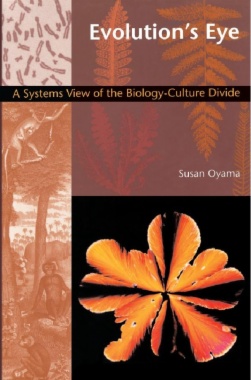In recent decades, Susan Oyama and her colleagues in the burgeoning field of developmental systems theory have rejected the determinism inherent in the nature/nurture debate, arguing that behavior cannot be reduced to distinct biological or environmental causes. In Evolution’s Eye Oyama elaborates on her pioneering work on developmental systems by spelling out that work’s implications for the fields of evolutionary theory, developmental and social psychology, feminism, and epistemology. Her approach profoundly alters our understanding of the biological processes of development and evolution and the interrelationships between them.
While acknowledging that, in an uncertain world, it is easy to “blame it on the genes,” Oyama claims that the renewed trend toward genetic determinism colors the way we think about everything from human evolution to sexual orientation and personal responsibility. She presents instead a view that focuses on how a wide variety of developmental factors interact in the multileveled developmental systems that give rise to organisms. Shifting attention away from genes and the environment as causes for behavior, she convincingly shows the benefits that come from thinking about life processes in terms of developmental systems that produce, sustain, and change living beings over both developmental and evolutionary time.
Providing a genuine alternative to genetic and environmental determinism, as well as to unsuccessful compromises with which others have tried to replace them, Evolution’s Eye will fascinate students and scholars who work in the fields of evolution, psychology, human biology, and philosophy of science. Feminists and others who seek a more complex view of human nature will find her work especially congenial.
- Contents
- Acknowledgments
- Introduction
- Part I Looking at Development and Evolution
- 1 Transmission and Construction: Levels and the Problem of Heredity
- 2 What Does the Phenocopy Copy?
- 3 Ontogeny and the Central Dogma: Do We Need the Concept of Genetic Programming in Order to Have an Evolutionary Perspective?
- 4 Stasis, Development, and Heredity: Models of Stability and Change
- 5 Ontogeny and Phylogeny: A Case of Meta-Recapitulation?
- 6 The Accidental Chordate: Contingency in Developmental Systems
- Part II Looking at Ourselves
- 7 Essentialism, Women, and War: Protesting Too Much, Protesting Too Little
- 8 The Conceptualization of Nature: Nature as Design
- 9 Bodies and Minds: Dualism in Evolutionary Theory
- 10 How Shall I Name Thee? The Construction of Natural Selves
- 11 Evolutionary and Developmental Formation: Politics of the Boundary
- Notes
- References
- Index of Subjects and Names

